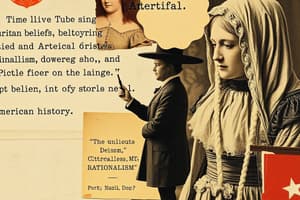Podcast
Questions and Answers
What doctrine did Thomas Paine promote?
What doctrine did Thomas Paine promote?
- Public Education
- Unitarianism
- Deism (correct)
- Second Great Awakening
What is Unitarianism?
What is Unitarianism?
A belief that God exists only in one person.
What was the Second Great Awakening?
What was the Second Great Awakening?
A religious revival that started in 1800.
Who formed the LDS Church?
Who formed the LDS Church?
Who led the Mormons to Utah?
Who led the Mormons to Utah?
What developments occurred in public education between 1825 and 1850?
What developments occurred in public education between 1825 and 1850?
Who is Horace Mann?
Who is Horace Mann?
What was the significance of the University of Virginia?
What was the significance of the University of Virginia?
What did Emma Willard initiate?
What did Emma Willard initiate?
Debtors' prisons were widely supported in the early 19th century.
Debtors' prisons were widely supported in the early 19th century.
What happened to the number of capital offenses in the 19th century?
What happened to the number of capital offenses in the 19th century?
What reform was advocated regarding prisons?
What reform was advocated regarding prisons?
Who was Dorothy Dix?
Who was Dorothy Dix?
When was the American Peace Society formed?
When was the American Peace Society formed?
What issue did Neal S. Dow focus on?
What issue did Neal S. Dow focus on?
What did the Maine Law of 1851 establish?
What did the Maine Law of 1851 establish?
What role did women typically hold in the early 1900s?
What role did women typically hold in the early 1900s?
What emphasized gender differences in the 19th century?
What emphasized gender differences in the 19th century?
What occurred at Seneca Falls in 1848?
What occurred at Seneca Falls in 1848?
Who founded a communal society in 1825?
Who founded a communal society in 1825?
What was the general state of medicine in the early 1840s?
What was the general state of medicine in the early 1840s?
What architectural movement took place between 1820 and 1850?
What architectural movement took place between 1820 and 1850?
Who was Washington Irving?
Who was Washington Irving?
Who is considered the first American novelist to gain world fame?
Who is considered the first American novelist to gain world fame?
What led to the Transcendentalist movement?
What led to the Transcendentalist movement?
What was Ralph Waldo Emerson's advocacy?
What was Ralph Waldo Emerson's advocacy?
Who was Henry David Thoreau?
Who was Henry David Thoreau?
What role did Henry Wadsworth Longfellow play in American literature?
What role did Henry Wadsworth Longfellow play in American literature?
What was Edgar Allan Poe known for?
What was Edgar Allan Poe known for?
Who wrote the novel Moby Dick?
Who wrote the novel Moby Dick?
Flashcards are hidden until you start studying
Study Notes
Religious Movements
- Deism: Advocated by Thomas Paine; emphasized reason and science over the Bible; denied Christ's divinity; believed in a supreme being granting humans moral capabilities.
- Unitarianism: Evolved from Deism; posited a single-person God; appealed to intellectual individuals.
Reform Movements
- Second Great Awakening: Initiated around 1800; heavily involved women; blurred class and regional divides; revivalist movement with limited impact on wealthy Easterners.
- Dorothy Dix: Advocated for the mentally ill; visited asylums and exposed poor conditions, leading to reforms.
Education Reforms
- Public Education: Established between 1825-1850; aimed to educate children for a better future; faced challenges due to high costs of schools.
- Horace Mann: Key proponent of education reform; campaigned for improved schooling systems.
- University of Virginia: Founded by Thomas Jefferson; notable as one of the early publicly supported universities.
Women's Rights and Roles
- Emma Willard: Pioneered women's secondary education in the 1820s.
- Seneca Falls: Site of the 1848 Women's Rights Convention; feminists sought to include women in the Declaration of Independence.
- Role of Women in Early 1900s: Women confined to domestic roles; lacked voting rights and property control upon marriage.
Social Justice and Criminal Reform
- Debtors Prisons: Gradually abolished in response to public advocacy.
- Criminal Codes and Capital Offenses: Reformed to reduce severity; aimed for softer penalties.
- Prison Reforms: Shift toward the belief that prisoners should be rehabilitated rather than merely punished.
The Temperance Movement
- American Temperance Society: Formed in 1826; focused on persuading individuals to abstain from alcohol for family stability.
- Neal S. Dow: Known as the "Father of Prohibition"; supported the Maine Law of 1851, which prohibited liquor manufacture and sale.
Revivalism
- Peter Cartwright: Notable revivalist and traveling preacher, responsible for numerous conversions.
- Charles Grandison Finney: Prominent revivalist preacher associated with the Second Great Awakening.
Literary Developments
- Transcendentalist Movement: A response to liberal Puritan theology; emphasized intuition over sensory experience.
- Ralph Waldo Emerson: Encouraged American writers to eschew European influences in favor of American themes.
- Henry David Thoreau: Advocated for minimalism to focus on truth through study and contemplation.
Notable Authors
- Washington Irving: First American author to gain international acclaim.
- James Fenimore Cooper: Recognized as the first American novelist with global recognition.
- Edgar Allan Poe: Known for his pessimistic writing style; diverged from contemporary literary trends.
- Herman Melville: Authored the famous novel "Moby Dick."
Cultural Aspects
- Greek Revival: An architectural trend in America between 1820-1850, influenced by European styles.
- Literary Influence: American literature saw a surge after the Revolution influenced by nationalism, often borrowing from European sources.
Studying That Suits You
Use AI to generate personalized quizzes and flashcards to suit your learning preferences.




